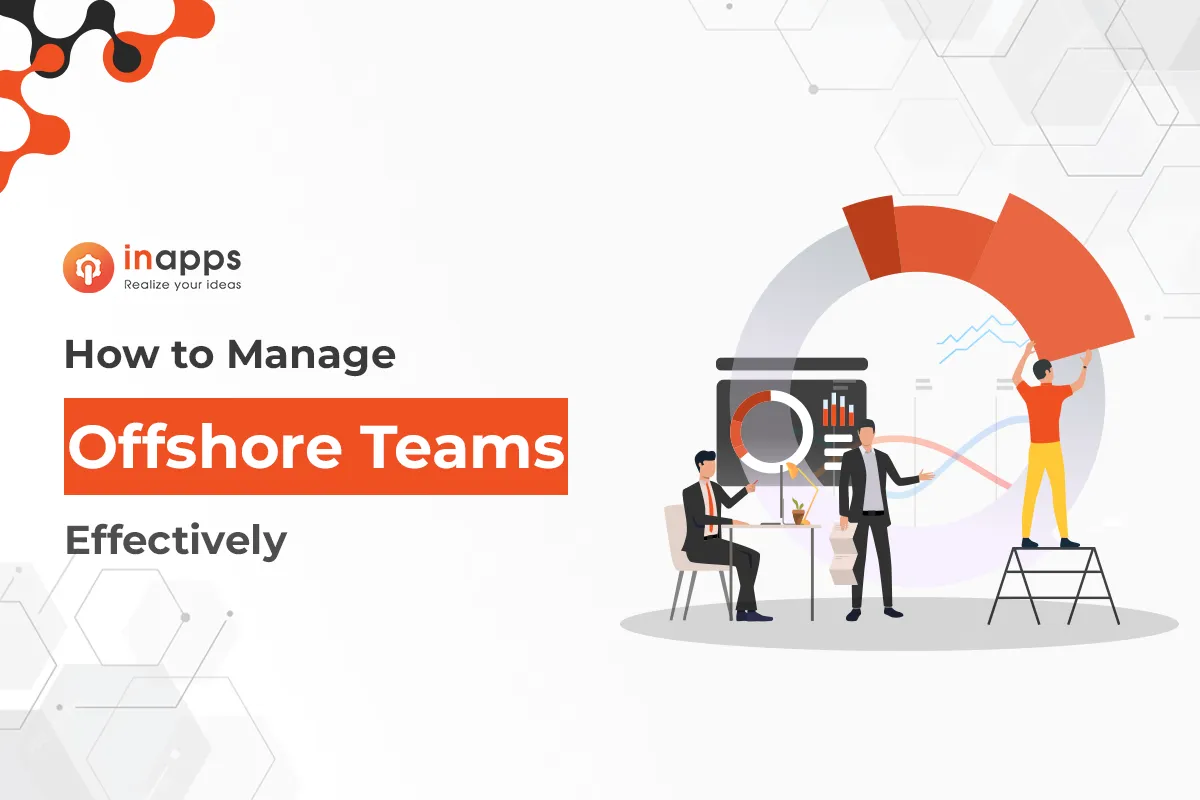- Home
- >
- Offshore News
- >
- 10 Proven Tips to Manage Offshore Teams Effectively
Outsourcing an offshore team helps you be cost-effective and quality-surpassed. However, working with offshore developers, who are not in your office, adds its own unique set of challenges.
In this article on how to manage an offshore development team, we want to share our top tips on managing offshore teams effectively.

How to manage an offshore team
Key Summary
- Overview: Effective management of offshore teams requires strategic planning, clear communication, and cultural alignment to ensure productivity and project success despite geographical and time zone differences.
- Key Strategies for Management:
- Clear Communication Channels:
- Use tools like Slack, Microsoft Teams, or Zoom for real-time and asynchronous communication.
- Establish regular check-ins (e.g., daily stand-ups, weekly reviews) to align goals and track progress.
- Defined Roles and Expectations:
- Clearly outline responsibilities, deliverables, and deadlines in a project plan.
- Use project management tools (e.g., Jira, Trello) to assign tasks and monitor status.
- Cultural Sensitivity:
- Understand cultural nuances (e.g., holidays, work styles) to foster respect and collaboration.
- Provide training on cross-cultural communication to bridge gaps.
- Time Zone Management:
- Schedule overlapping work hours for critical meetings to accommodate time differences.
- Leverage asynchronous updates (e.g., email, shared docs) for non-urgent tasks.
- Performance Monitoring:
- Set measurable KPIs (e.g., task completion rates, bug counts) to evaluate team performance.
- Conduct regular performance reviews and provide constructive feedback.
- Team Engagement:
- Build rapport through virtual team-building activities (e.g., online games, coffee chats).
- Recognize achievements with rewards or public acknowledgment to boost morale.
- Technology and Tools:
- Use version control (e.g., Git) and CI/CD pipelines for seamless code collaboration.
- Implement cloud-based platforms (e.g., Google Workspace, Confluence) for shared resources.
- Clear Communication Channels:
- Key Challenges:
- Communication Barriers: Language differences or unclear instructions can cause delays.
- Trust Building: Remote settings may hinder relationship development.
- Quality Control: Ensuring consistent deliverables across distributed teams.
- Best Practices:
- Assign a dedicated project manager to oversee coordination and resolve issues.
- Document processes thoroughly to ensure clarity and repeatability.
- Invest in training to upskill the team and align with project standards.
- Foster transparency by sharing project goals and progress updates regularly.
1. First Steps To Better Offshore Team Management: Change Your Mindset
> Read more: Structure an offshore team: pros and cons
Working with the ODC (Offshore Development Center) model, you will be playing a main offshore team management role as a team leader, collaborating harmoniously with the project manager provided by the vendor.
If it’s your first time leading an offshore team, it’s okay to feel a mix of excitement and apprehension. The greatest leaders were once beginners, so let’s focus on the positive.
Managing an offshore team gives you plenty of growth opportunities that will challenge your perceptions and enrich your experience. It is a chance for you to practice and get your leadership to shine. Guidance, solution, vision, teamwork, direction, strategy, communication, and goal are all the things you will need to convey directly to the team, to develop the team as well as achieve your target at the same time.

2. Share Your Product Vision With Your Offshore Teams
Many people make the mistake of randomly assigning easy work items to offshore developers. Don’t make the mistake of not giving them the full product vision.
All developers need to understand what the goal is and where the project is going. Paint them a picture of your product vision, so your development team can make smart choices as they are implementing the project.
They also need to understand and be able to see the upcoming work items to do. They want to know they have job security and where the project is going. Be sure to share with them details about the release, sprint planning, and timeline.
2. Establish Strong Communication with Offshore Teams
When you’re working with a team that’s not in the same place as you, it’s really easy for them to not know what’s happening. If you were all in an office together, it would be easy to catch up and know what’s going on just by being there.
It’s important to talk a lot with your team who works from far away. Let them know what’s happening with the business. But, don’t just talk to them during your regular meetings or only once a day. Make sure to talk to each person by themselves every day too. This helps you check if they are doing okay with their work and see if you can help them with anything.
Read more: Best Communication Tools for Your Offshore Teams
2.1 Remember to make use of video conferencing.
Doing daily scrum meetings by phone or over Slack works well. But video adds the real human element that can help with team building. You must get to know your team and build real human relationships with them.
Video can also help you better identify people’s emotions and moods. It is important to make sure your team is happy and getting work done. Team members often hide their real feelings behind a keyboard, so make sure to ask them how they are progressing on a project. This way, you can track their progress as well as check in to see if there’s help needed to ensure project success and lift team spirits.
Video conferencing via Skype, Zoom, or other platforms is a great way to do this. We do all of our daily scrum meetings over Skype video calls for this purpose.

2.2 Get Your Point Across with Pictures and Video
Software development is all about communication. Nothing works better than a screenshot or quick video.
It can take just a few seconds to take a screenshot of something and doodle on it. That little doodle can help people instantly visualize and understand what you are talking about. It can save hours.
Another tip is to do the same thing with video. It makes it effortless to record a really quick video. Record some feedback about their work or a quick training video and instantly email it.
3. Simplify Your Communication With Offshore Team Members
Depending on where your company and your offshore team are, they may not be as fluent in your language as you are. The best thing you can do is simplify your communication.
Simplify it by limiting your vocabulary, and avoiding metaphors, and cultural references they won’t understand.
Get straight to the point and state the obvious. Be very clear with your directions. If their fluency in your language is not good, get to the point and don’t make them assume anything.

Offshore Team Management
4. Understand Cultural Differences
When you work with people from different countries, it’s important to learn about their cultures. This helps you understand how they think and work. You can read about their country, how they talk to each other, and what holidays they celebrate.
For example, the Lunar New Year, known as Tết, is the most important holiday in Vietnam. It’s a time when many Vietnamese developers take extended time off to be with their families. Being mindful of this and planning deadlines or meetings around Tết shows respect for their traditions and ensures smoother project flow.
Read more: 7 Tips to Embrace Cultural Differences with Offshore Teams
To foster a culturally inclusive team environment, you can have sessions where everyone gets to learn about different cultures. This includes how people communicate, how they view leadership, and how they make decisions. Another important thing is to celebrate everyone’s culture. You can do this by sharing stories from your culture, trying traditional foods, or celebrating important holidays together. Doing these things helps everyone get along better and respect each other more.
5. Have Flexible Work Schedules
One of the biggest challenges with managing offshore teams effectively is working in vastly different time zones.
Luckily, most offshore developers can be flexible with time zone differences, but look for those with experience in delivering flexible deadlines. This enables us to have time for daily meetings, scrum, and Q&A. The shifted hours can also work as an advantage if you could spend extra cost on your team for overtime working hours.
6. Keep Their Work Queue Full, Including a “B” Task
There will be many times when your offshore team may get stuck and need help from someone else. The last thing you want to do is have them get stuck and get nothing accomplished.
There are countless reasons that developers get stuck in the middle of their work. From weird compilation, issues check-in by someone else, business logic questions, lack of clear requirements, etc.
We suggest always having multiple work items in their queue so if they get stuck, they have someone else who can work on them. If they get stuck on their “A” task, make sure they have a “B” or “C” priority item they can work on in the meantime.
7. Give Your Offshore Teams Real Work To Do
Just because you can find offshore developers for $17 an hour, that doesn’t mean you need to only give them donkey work to do. They make $17 an hour because of the cost of living where they live, not because they are junior developers.
If you want to recruit and retain top talent on your offshore team, don’t make them do donkey work. There are highly skilled developers all over the world. Treat them like it!
8. Avoid Micromanaging and Be Supportive
Nobody likes to be micromanaged. It is also hard to scale your development team if you can’t empower them and trust them to do the work that needs to be done. Your offshore team must have a strong senior developer who can act as a team lead.
If you are having problems getting things done properly, consider if your offshore team lacks senior-level leadership. Many companies make the mistake of just trying to hire low-skilled developers.
It is in the best interest of you and your offshore partner both to ensure that your offshore team can be self-managing and successful, thereby resulting in higher performance. Make sure you have the right mix of senior developers and potentially a project manager.
9. Treat Them Like Your Team, Not an Offshore Team
One of the biggest mistakes is creating an us vs them mentality. Don’t keep your offshore team at arm’s length. Treat them like they are part of your team, they just happen to work remotely.
- Avoid the us vs them mentality
- Include them in all communication — don’t leave them in the dark
- Include them in company and team meetings. It’s a loss if the offshore team members are not able to contribute ideas when they participate in the iteration demo due to the time zone.
- Meet with them regularly online and even in person

Offshore Team Management
10. Hire the Right Offshore Team For Your Project
There are talented software developers everywhere, but Vietnam is a new tech hub for offshore development outsourcing.
To hire the right offshore team for your project in Vietnam, focus on their expertise, experience, and communication skills. Look for teams with a proven track record in your industry or technology. Ensure they understand your goals and can integrate well with your existing team. Assess their problem-solving abilities and ensure they have a strong project management approach. It’s crucial to have clear, regular communication channels to keep your project on track.
Read more:
- Why should I choose outsourcing to Vietnam?
- How To Choose The Right Software Development Company In Vietnam?
Here are some of the top reasons to hire InApps Technology developers:
- English communication— 75% can read and understand spoken English.
- Cost-efficiency — You can find excellent developers for $17-$22 per hour.
- Good Communication Skills — They are good communicators and aren’t afraid to speak up or challenge you. They want to do a good job and succeed.
- Talented workforce — Young developers who studied and worked abroad in the US, Australia, Northern Europe, or Japan.
- High-level of Tech skills — Excellent at analysis, troubleshooting, and tech solution brainstorming. They are passionate developers who love what they do and desire for self-development.
- Our case studies
REQUEST A DEDICATED TEAM
Don’t take our word for it!
>> Read more: 4 reasons to hire InApps full-stack developer team

Offshore Team Management
Need help building an offshore development team in Vietnam? InApps Technology can help! CONTACT US
Let’s create the next big thing together!
Coming together is a beginning. Keeping together is progress. Working together is success.

















